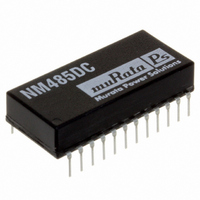NM485DC Murata Power Solutions Inc, NM485DC Datasheet - Page 5

NM485DC
Manufacturer Part Number
NM485DC
Description
ISOLATED INTERFACE EIA-485 DL
Manufacturer
Murata Power Solutions Inc
Datasheet
1.NM485DC.pdf
(7 pages)
Specifications of NM485DC
Data Rate
1.25Mbps
Package / Case
24-DIP (0.667", 16.95mm)
Inputs - Side 1/side 2
RS-485
Number Of Channels
4
Isolation Rating
1000Vrms
Voltage - Supply
4.75 V ~ 5.25 V
Propagation Delay
72ns
Output Type
Tri-State
Operating Temperature
0°C ~ 60°C
Supply Voltage Range
4.75V To 5.25V
Logic Case Style
DIP
No. Of Pins
24
Operating Temperature Range
0°C To +60°C
Svhc
No SVHC (18-Jun-2010)
Base
RoHS Compliant
Lead Free Status / RoHS Status
Lead free / RoHS Compliant
Lead Free Status / RoHS Status
Lead free / RoHS Compliant
Other names
811-1445-5
Available stocks
Company
Part Number
Manufacturer
Quantity
Price
Company:
Part Number:
NM485DC
Manufacturer:
Murata Power Solutions Inc
Quantity:
135
www.murata-ps.com
APPLICATION NOTES (continued)
TECHNICAL NOTES
ISOLATION VOLTAGE
‘Hi Pot Test’, ‘Flash Tested’, ‘Withstand Voltage’, ‘Proof Voltage’, ‘Dielectric Withstand Voltage’ & ‘Isolation Test Voltage’ are all terms that relate to the same thing, a test voltage,
applied for a specifi ed time, across a component designed to provide electrical isolation, to verify the integrity of that isolation.
Murata Power Solutions NM485DC series of DC/DC converters are all 100% production tested at their stated isolation voltage. This is 1000Vrms for 1 second.
A question commonly asked is, “What is the continuous voltage that can be applied across the part in normal operation?”
For a part holding no specifi c agency approvals, such as the NM485DC series, both input and output should normally be maintained within SELV limits i.e. less than 42.4V peak, or
60VDC. The isolation test voltage represents a measure of immunity to transient voltages and the part should never be used as an element of a safety isolation system. The part
could be expected to function correctly with several hundred volts offset applied continuously across the isolation barrier; but then the circuitry on both sides of the barrier must
be regarded as operating at an unsafe voltage and further isolation/insulation systems must form a barrier between these circuits and any user-accessible circuitry according to
safety standard requirements.
REPEATED HIGH-VOLTAGE ISOLATION TESTING
It is well known that repeated high-voltage isolation testing of a barrier component can actually degrade isolation capability, to a lesser or greater degree depending on materials,
construction and environment. The NM485DC series has toroidal isolation transformers, with no additional insulation between primary and secondary windings of enameled wire.
While parts can be expected to withstand several times the stated test voltage, the isolation capability does depend on the wire insulation. Any material, including this enamel
(typically polyurethane) is susceptible to eventual chemical degradation when subject to very high applied voltages thus implying that the number of tests should be strictly limited.
We therefore strongly advise against repeated high voltage isolation testing, but if it is absolutely required, that the voltage be reduced by 20% from specifi ed test voltage.
This consideration equally applies to agency recognized parts rated for better than functional isolation where the wire enamel insulation is always supplemented by a further
insulation system of physical spacing or barriers.
RoHS COMPLIANCE INFORMATION
NM485D receiver output status
The receiver output will be high (>2.7V) when the differential input lines are left open (open circuit). However, when a line termination resistor is attached, the inputs are
effectively shorted together, not left fl oating. Since the receiver has typically 70mV of hysteresis, the output will remain in its last active state, high or low.
To force the receiver output to a known state, the confi guration shown in fi gure 7 should be used. It should be noted that this arrangement will use typically 100mW of
power, for each receiver connected in this manner.
The termination resistors are used to generate a DC bias, which forces the receiver into a high state, when no signal is applied. This arrangement will still allow the output
to switch due to a change at the input, whilst maintaining line termination characteristics.
This series is compatible with RoHS soldering systems with a peak wave solder temperature of 300ºC for 10 seconds. The pin termination
fi nish on this product series is Matte Tin over Nickel Preplate. The series is backward compatible with Sn/Pb soldering systems.
For further information, please visit www.murata-ps.com/rohs
Technical enquiries email: mk@murata-ps.com, tel: +44 (0)1908 615232
Isolated Dual EIA-485 Driver and Receiver
NM485DC Series
2009-12-09 KII_NM485DC.A03 Page 5 of 7



















